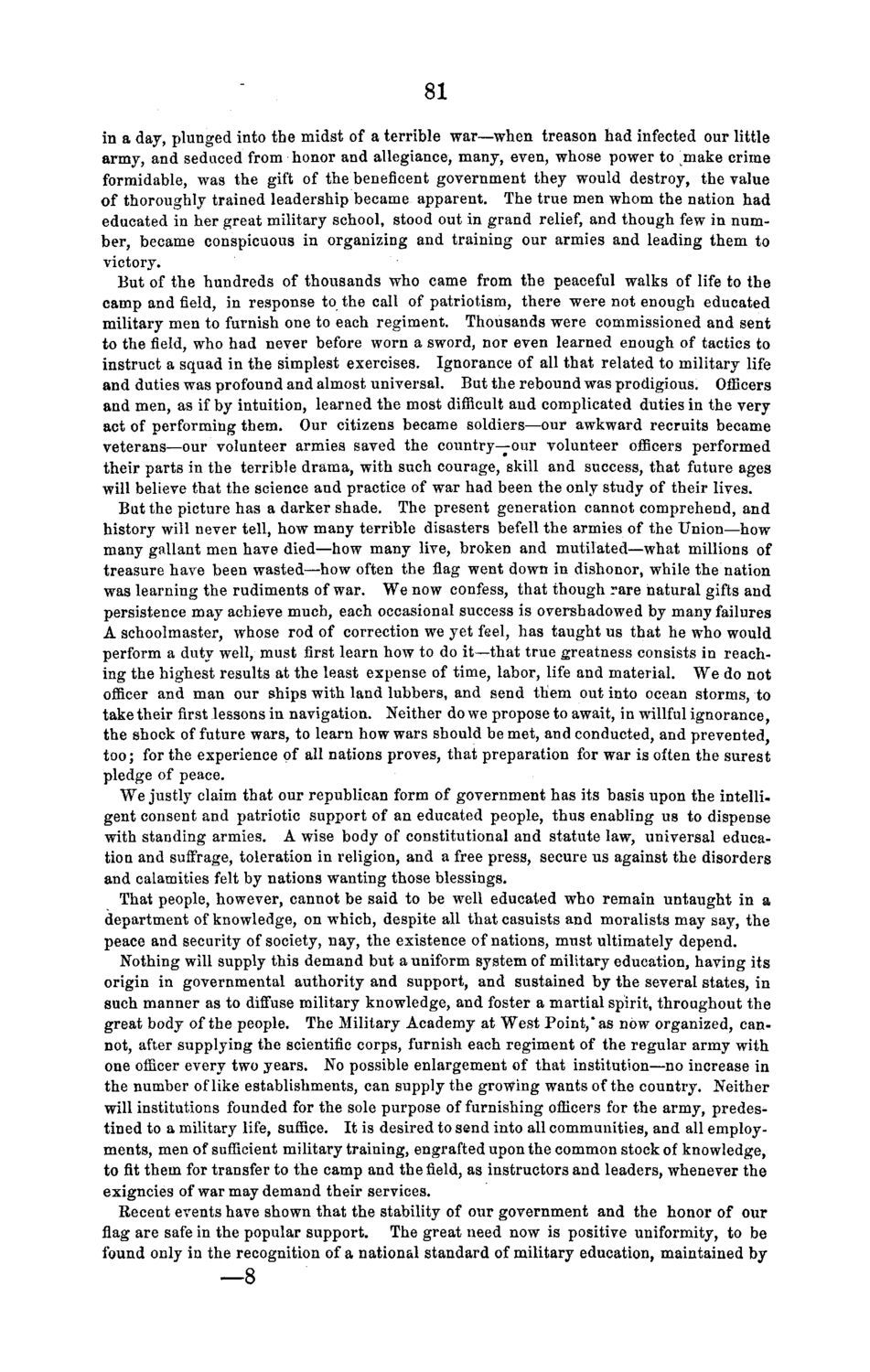| |
| |
Caption: Board of Trustees Minutes - 1868
This is a reduced-resolution page image for fast online browsing.

EXTRACTED TEXT FROM PAGE:
81 in a day, plunged into the midst of a terrible war—when treason had infected our little army, and seduced from honor and allegiance, many, even, whose power to make crime formidable, was the gift of the beneficent government they would destroy, the value of thoroughly trained leadership became apparent. The true men whom the nation had educated in her great military school, stood out in grand relief, and though few in number, became conspicuous in organizing and training our armies and leading them to victory. But of the hundreds of thousands who came from the peaceful walks of life to the camp and field, in response to the call of patriotism, there were not enough educated military men to furnish one to each regiment. Thousands were commissioned and sent to the field, who h a d never before worn a sword, nor even learned enough of tactics to instruct a squad in the simplest exercises. Ignorance of all that related to military life and duties was profound and almost universal. But the rebound was prodigious. OflBcers and men, as if by intuition, learned the most difficult and complicated duties in the very act of performing them. Our citizens became soldiers—our awkward recruits became veterans—our volunteer armies saved the country—our volunteer officers performed their parts in the terrible drama, with such courage, skill and success, that future ages will believe that the science and practice of war had been the only study of their lives. But the picture has a darker shade. The present generation cannot comprehend, and history will never tell, how many terrible disasters befell the armies of the Union—how many gallant men have died—how many live, broken and mutilated—what millions of treasure have been wasted—how often the flag went down in dishonor, while the nation was learning the rudiments of war. We now confess, that though rare natural gifts and persistence may achieve much, each occasional success is overshadowed by many failures A schoolmaster, whose rod of correction we yet feel, has taught us that he who would perform a duty well, must first learn how to do it—that true greatness consists in reaching the highest results at the least expense of time, labor, life and material. W e do not officer and man our ships with land lubbers, and send them out into ocean storms, to take their first lessons in navigation. Neither do we propose to await, in willful ignorance, the shock of future wars, to learn how wars should be met, and conducted, and prevented, t o o ; for the experience of all nations proves, that preparation for war is often the surest pledge of peace. We justly claim that our republican form of government has its basis upon the intelligent consent and patriotic support of an educated people, thus enabling us to dispense with standing armies. A wise body of constitutional and statute law, universal education and suffrage, toleration in religion, and a free press, secure us against the disorders and calamities felt by nations wanting those blessings. That people, however, cannot be said to be well educated who remain untaught in a department of knowledge, on which, despite all that casuists and moralists may say, the peace and security of society, nay, the existence of nations, must ultimately depend. Nothing will supply this demand but a uniform system of military education, having its origin in governmental authority and support, and sustained by the several states, in such manner as to diffuse military knowledge, and foster a martial spirit, throughout the great body of the people. The Military Academy at West Point," as now organized, cannot, after supplying the scientific corps, furnish each regiment of the regular army with one officer every two years. No possible enlargement of that institution—no increase in the number of like establishments, can supply the growing wants of the country. Neither will institutions founded for the sole purpose of furnishing officers for the army, predestined to a military life, suffice. It is desired to send into all communities, and all employments, men of sufficient military training, engrafted upon the common stock of knowledge, to fit them for transfer to the camp and the field, as instructors and leaders, whenever the exigncies of war may demand their services. Recent events have shown that the stability of our government and the honor of our flag are safe in the popular support. The great need now is positive uniformity, to be found only in the recognition of a national standard of military education, maintained by —8
| |